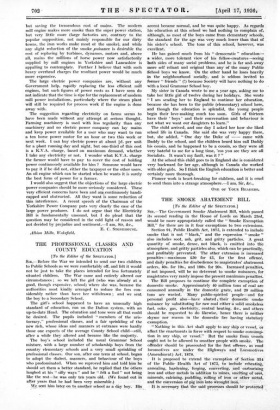THE SMOKE ABATEMENT BILL
[To the Editor of the SPECTATOR.] SIR,—The Government Smoke Abatement Bill, which passed its second reading in the House of Lords on March 23rd, would be more appropriately called the " Smoke Exemption Bill," for there are in it four exemptions to two extensions.
Section 91, Public Health Act, 1875, is extended to include smoke that is not " black," and the expression " smoke " also includes soot, ash, grit, and gritty particles. A great quantity of smoke, dense, not black, is emitted into the atmosphere, and gritty particles also, which can be practically, and profitably prevented. The other extension is increased penalties—maximum £50 for £5, tor the first offence, and daily penalties for disobedience to magistrates' abatement orders, 40s. for 10s., and 100s. for 20s. Increased penalties, if not imposed, will be no deterrent to smoke nuisances, for magistrates very rarely impose the present maximum penalties.
The Bill proposes to continue the complete exemption of domestic smoke. Approximately 40 million tons of coal are consumed annually in the domestic grate, and 20 million tons are wasted.. Many public-spirited people—and for personal profit also—have abated , their domestic smoke nuisance by substituting for raw coal either a solid smokeless fuel, coke, gas, electricity, central heating, &c., and others should be requested to do likewise, hence there is neither rhyme nor reason in the domestic fire having statutory exemption.
"Nothing in this Act shall apply to any ship or vessel, 'Or affect the enactments in force with respect to smoke consump- tion in any -ship, or vessel." But the smoke from vessels ought not to be allowed to smother people with smoke. The offender should be prosecuted for the first offence, as road locomotives are under the Highways and Locomotives (Amendment) Act, 1878.
It is proposed to extend the exemption of Section 334 of the Public- Health Act of 1875, to include reheating, annealing, hardening, forging, converting, and carburizing iron and other metal's in addition to mines, smelting of oral, minerals, calcining, puddling, rolling of iron or other metal. and the conversion of pig iron into wrought iron.
It is necessary that the said processes should be protected tea up to the point of practicability, so as not to obstruct or interfere with the efficient heat treatment of steel. But 80 per cent. of the smoke now made can be practically prevented, and its prevention would not hinder trade, but help it, by saving a huge quantity of coal and increasing the output of the furnaces, and the unnecessary smoke ought not to be exempt.
" If it appears to a Local Authority that a smoke nuisance exists on any premises within their district occupied for the public service of the Crown, they shall report to the Govern- ment Department, and if the Minister responsible is satisfied after enquiry that the nuisance exists, he shall take such steps as are necessary to abate it, and prevent a recurrence." But the Government ought to set an example, first abating their own nuisances—Corporations also—before requiring private firms to abate theirs.
When the writer went to India as " Smoke Expert " for the Government, he found the Government and Corporation chimneys creating as great smoke nuisances as private firms, or greater. The Government and Corporations were first prevailed upon to take the necessary steps to abate the nuisances, then private firms followed the excellent example.
If thaNaaid furnaces and fires are included in the Bill—and they outfit to be—instead of being exempt, no injustice will be done to anyone, and if competent officers are appointed by the Government to advise, and see that• the delinquent authorities administer the necessary further powers, then trade will not be hindered but greatly helped. The public health will be greatly improved, and there will be reduced mortality, less fog, more sunshine, and an atmosphere not polluted and poisoned, but fit for a civilized people to breathe.—I am, .Sir, W. NICHOLSON (Chief Smoke Inspector, Sheffield.)



























































 Previous page
Previous page